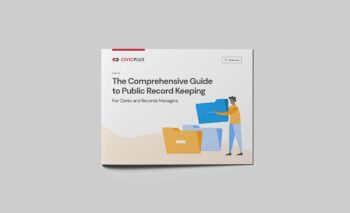What is a Public Record?
Over 50 years ago, lawmakers passed the Freedom of Information Act. You may see yourself as a public records veteran or as someone who can’t even define them. But there’s something here for anyone who wants to learn about one of the cornerstones of government transparency.
A public record refers to information that has been recorded and/or filed by a public agency. The Freedom of Information Act (FOIA) was passed in the United States in 1966 to provide access to the American people to everything touched by a government worker or tax dollar at any level of government.
What do Public Records Include?
What constitutes a public record is broad and is always changing. This is especially true as governments adopt new technologies, such as email, body cameras, and text messages.
Here’s a non-exhaustive list of classes of public records.
- After-action reports
- Agendas
- Algorithms
- Audio
- Calendars
- Commissioned artwork
- Construction plans
- Contractor agreements
- Contracts
- Court records
- Emails
- FBI files
- Grant applications
- Inspection reports
- Investigatory files
- Letters
- Maps
- Meeting minutes
- Memorandums
- Metadata
- Military Records
- Notes
- Permits
- Photographs
- Receipts
- Recorded Tapes
- Reports
- Social Media
- Surveillance Footage
- Text Messages
- Video
Public Records FAQs
Are Public Records Laws the Same in Each State?
No. Each U.S. state manages public records differently. Each has specific policies and regulations that govern the availability of information and they are also referred to differently in each state. For example, requests can go by Sunshine requests in states like Florida, Louisiana, and Missouri. They are open records requests in states like North Dakota, Ohio, Oklahoma, and Wisconsin. Or, they have names unique to one state. For instance, CPRA’s in California, CORA’s in Colorado, OPRA’s in New Jersey, PIA’s in Maryland, MGDPA’s in Minnesota, OPRL’s in Oregon, TPRA’s in Tennessee, TPIA’s in Texas, and GRAMA’s in Utah. These names are often connected to a state’s specific law. For example, the California Public Records Act or the Texas Public Information Act.
The internet has many helpful resources for specific states, like this one from the League of California Cities.
The added complexity varies state by state, and each has specific exemptions that apply only to its public record law. For example, in Connecticut, “park employees [are] exempt due to not being a public agency by the law[’]s definitions.”
How Do You Find Public Records?
This is where some real detective work comes in. It is a learned skill to know how to narrow down a search so that you don’t sift through unnecessary data or even pay for it.
Many governments have digital request forms to help individuals make requests on their websites. Others require you to appear in person for requests. Some states require you to be a resident of that state to make a request, like Tennessee.
Navigating through the intricacies of public records requests is a developed skill set, but there are a ton of resources out there to help folks get started. We found that the Harvard Law School Library has an excellent guide.
Governments that have an open records portal or who use public records software tend to have a more transparent process on how to access information. One of our most transparent customers, the City of Albuquerque, publishes over 80 percent of the records requests that they receive. Published requests mean that information only has to be requested once, saving the City time and getting information to the requester faster.
What is a Public Records Request?
A public records request is a formal application submitted by an individual or organization seeking access to information held by government agencies. Laws like the Freedom of Information Act (FOIA) in the United States give the public the right to ask for access to federal agency records or information. However, there are certain exceptions. The FOIA ensures that residents can get information about their government’s operations and activities.
This allows people to access government information and helps create informed and engaged residents. The same principles apply to local government records, and requests for them are usually governed by state laws.
How Much Do Requests Cost?
Public records aren’t always free; charging a fee for producing a public record is common practice and varies across the country. Some states have a state-wide fee schedule that governments must adhere to. Others, like Alabama, don’t have a fee schedule for providing access to public records, leaving it up to the agency to “fix a reasonable fee to be charged” unless the fee is set by statute or rule. In recent years, reasonable fees have been disputed as more states have sought to further define the term “reasonable.”
Fee structures for records vary by government. Some charge a flat hourly rate for the hours it takes to search, review, and redact public records. Rhode Island charges a $15-per-hour search and retrieval fee after the first hour, while Colorado charges a $30-per-hour one. Some governments charge for the printing of public records. Some charge for the labor. Many states don’t allow for the collection of fees for public records at all, like California, Illinois, Ohio, Pennsylvania, and Washington.
What Would Never Be Considered a Public Record?
Exemptions vary state by state, making them tricky to navigate. Exemptions can fall into two groups. “Categorical exemptions” are when a particular type of information or record is exempt, and “conditional exemptions” refer to exempting a record depending on the effect on a privacy right or government interest it might have. Examples of statutes incorporated into the public record law use a variety of terms such as “confidential,” “privileged,” “not discoverable or admissible,” or “shall not be disclosed” to create exemptions.
Some records are difficult, and most times impossible to access, such as:
- Personal records/attorney-client privilege records
- Personal information
- Records relating to national security
- Trade secrets
- Various law enforcement techniques
Just because something is delivered as a public record does not mean that it’ll always be a public record. In 2016, a California Supreme Court ruled that if a public agency inadvertently releases a document that should have been exempt, it can demand that the recipient give the document back or else destroy it.
Where Does One Begin in Making a Request?
First, think about the information you really want and need. Making a request as specific as possible helps the government agency understand exactly what you’re looking for. The open records organization MuckRock has examples of requests for every state, so you don’t have to start from scratch.
If you’re making a request to a city, county, university, or other municipality that employs CivicPlus for the use of our NextRequest solution, however, you’ll surely find the easy-to-access and use web portal to be the best request software option on the market.
Links
https://www.muckrock.com/news/archives/2017/jan/27/whats-public-record/
https://www.muckrock.com/place/list/?page=1&per_page=100&level=s
https://ballotpedia.org/Requesting_copies_of_public_records
https://www.muckrock.com/foi/list/
https://www.huffpost.com/entry/fees-for-public-records_n_4119049
https://www.atg.wa.gov/open-government-internet-manual/chapter-2


